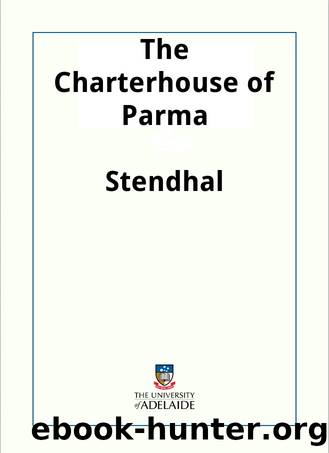The Charterhouse of Parma by Unknown

Author:Unknown
Format: epub
Publisher: The University of Adelaide Library
https://ebooks.adelaide.edu.au/s/stendhal/charter/chapter14.html
Last updated Tuesday, August 25, 2015 at 14:13
The Charterhouse of Parma, by Stendhal
CHAPTER FIFTEEN
A couple of hours later, the unfortunate Fabrizio, fitted with handcuffs and actually attached by a long chain
to the sediola into which he had been made to climb, started for the citadel of Parma, escorted by eight constables. These had orders to take with them all the constables stationed in the villages through which the procession had to pass; the podestà in person followed this important prisoner. About seven oâclock in the evening the sediola, escorted by all the little boys in Parma and by thirty constables, came down the fine avenue of trees, passed in front of the little palazzo in which Fausta had been living a few months earlier, and finally presented itself at the outer gate of the citadel just as General Fabio Conti and his daughter were coming out. The governorâs carriage stopped before reaching the drawbridge to make way for the sediola to which Fabrizio was attached; the General instantly shouted for the gates to be shut, and hastened down to the turnkeyâs office to see what was the matter; he was not a little surprised when he recognised the prisoner, who had grown quite stiff after being fastened to his sediola throughout such a long journey; four constables had lifted him down and were carrying him into the turnkeyâs office. âSo I have in my power,â thought the feather-pated governor, âthat famous Fabrizio del Dongo, with whom anyone would say that for the last year the high society of Parma had taken a vow to occupy themselves exclusively!â
The General had met him a score of times at court, at the Duchessaâs and elsewhere; but he took good care not to shew any sign that he knew him; he was afraid of compromising himself.
âHave a report made out,â he called to the prison clerk, âin full detail of the surrender made to me of the prisoner by his worship the podestà of Castelnuovo.â
Barbone, the clerk, a terrifying personage owing to the volume of his beard and his martial bearing, assumed an air of even greater importance than usual; one would have called him a German gaoler. Thinking he knew that it was chiefly the Duchessa Sansevérina who had prevented his master from becoming Minister of War, he was behaving with more than his ordinary insolence towards the prisoner; in speaking to him he used the pronoun voi, which in Italy is the formula used in addressing servants.
âI am a prelate of the Holy Roman Church,â Fabrizio said to him firmly, âand Grand Vicar of this Diocese; my birth alone entitles me to respect.â
âI know nothing about that!â replied the clerk pertly; âprove your assertions by shewing the brevets which give you a right to those highly respectable titles.â
Fabrizio had no such documents and did not answer. General Fabio Conti, standing by the side of his clerk, watched him write without raising his eyes to the prisoner, so as not to be obliged to admit that he was really Fabrizio del Dongo.
Download
This site does not store any files on its server. We only index and link to content provided by other sites. Please contact the content providers to delete copyright contents if any and email us, we'll remove relevant links or contents immediately.
| Africa | Americas |
| Arctic & Antarctica | Asia |
| Australia & Oceania | Europe |
| Middle East | Russia |
| United States | World |
| Ancient Civilizations | Military |
| Historical Study & Educational Resources |
Machine Learning at Scale with H2O by Gregory Keys | David Whiting(4290)
Never by Ken Follett(3934)
Fairy Tale by Stephen King(3368)
Oathbringer (The Stormlight Archive, Book 3) by Brandon Sanderson(3135)
The Man Who Died Twice by Richard Osman(3070)
Will by Will Smith(2906)
Rationality by Steven Pinker(2349)
Can't Hurt Me: Master Your Mind and Defy the Odds - Clean Edition by David Goggins(2319)
The Dark Hours by Michael Connelly(2299)
Friends, Lovers, and the Big Terrible Thing by Matthew Perry(2218)
The Dawn of Everything: A New History of Humanity by David Graeber & David Wengrow(2187)
Principles for Dealing With the Changing World Order: Why Nations Succeed and Fail by Ray Dalio(2034)
A Short History of War by Jeremy Black(1841)
HBR's 10 Must Reads 2022 by Harvard Business Review(1834)
Go Tell the Bees That I Am Gone by Diana Gabaldon(1746)
A Game of Thrones (The Illustrated Edition) by George R. R. Martin(1710)
Kingdom of Ash by Maas Sarah J(1664)
515945210 by Unknown(1660)
443319537 by Unknown(1542)
